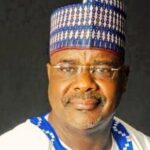“This is the real danger: democracy cannot endure where rule-breakers are rewarded, where ego supersedes law, where impunity becomes culture, where public office serves as a battlefield for personal wars”.
BY BELLO GWARZO ABDULLAHI

This is the third time I am compelled to write about Barrister Nyesom Wike, the Minister of the Federal Capital Territory. Not out of fascination, but out of genuine alarm over the escalating risks his political conduct poses to Nigeria’s stability. At moments like this, silence becomes complicity.
Let us speak plainly: the collapse of the Peoples Democratic Party—Nigeria’s major opposition—was not spontaneous. It was engineered. And Wike was the chief demolition contractor. His reward came swiftly: control of the FCT. His entire political journey has followed one predictable script—weaponize patronage, wreck alliances, and batter institutions. From Local Government Chairman to Chief of Staff, to Minister of State for Education, to Governor, and now FCT Minister, the pattern remains unchanged: disruption, division, domination.
Wherever Wike operates, institutions buckle. Factions emerge. Governance becomes captive to personal grudges. His leadership style is built on defying norms, eroding due process, and turning public service into a theatre of relentless confrontation. Rivers State lived through this—first in his break with Dr. Peter Odili, then in his destructive feud with Mr. Rotimi Amaechi. The actors changed; the turbulence never did.
The Ijaw Nation experienced the same turbulence. Under the watch of late Chief Edwin Clark, Governor Siminalayi Fubara—the first non-Ikwerre leader of Rivers State since 1999—was dragged into an unnecessary crisis that ballooned into a six-month political siege. The aftermath was historic: the collapse of PDP structures into the APC and a one-term ceiling imposed on Fubara under the façade of a “peace” agreement. These events unfolded in full public view, emboldening Wike’s sense of impunity.
Betrayal has become his political signature. Loyalty flows only toward him, never from him. His politics—volatile, personal, and crisis-driven—may provide spectacle, but it corrodes governance at its root. And now, the APC-led Federal Government is learning this the hard way, as the Wike–Yerima hostilities drag the Federal Capital into avoidable turmoil.
But something has changed. For the first time, the backlash is national. The leadership of the Armed Forces—joined by countless patriotic Nigerians—has openly criticized his conduct. His ego has taken a public hit, and that alone is reason for concern. Democracies do not survive when military institutions are pulled into political mud-wrestling.
Today, the Federal Government is carrying burdens it never needed. Wike’s brinkmanship has inflamed tensions, stirred public anger, and reinforced the perception that Abuja is sheltering a political arsonist. At a time when Nigeria urgently needs calm, discipline, and serious governance, one man’s turbulence is consuming the nation’s attention and oxygen.
This is the real danger: democracy cannot endure where rule-breakers are rewarded, where ego supersedes law, where impunity becomes culture, where public office serves as a battlefield for personal wars. If this political style is not confronted, it will not fade—it will spread.
Nigeria must stop normalizing this behaviour. It is abnormal. It is corrosive. It is profoundly destabilizing.
The Federal Government must now choose: restore discipline and safeguard its institutions, or continue cleaning up the wreckage of one man’s chaotic politics. For national stability—and collective sanity—firm boundaries must finally be drawn.
Chaos is not governance. And enabling chaos is not leadership.
…Engr. B.G. Abdullahi is based in Gombe









